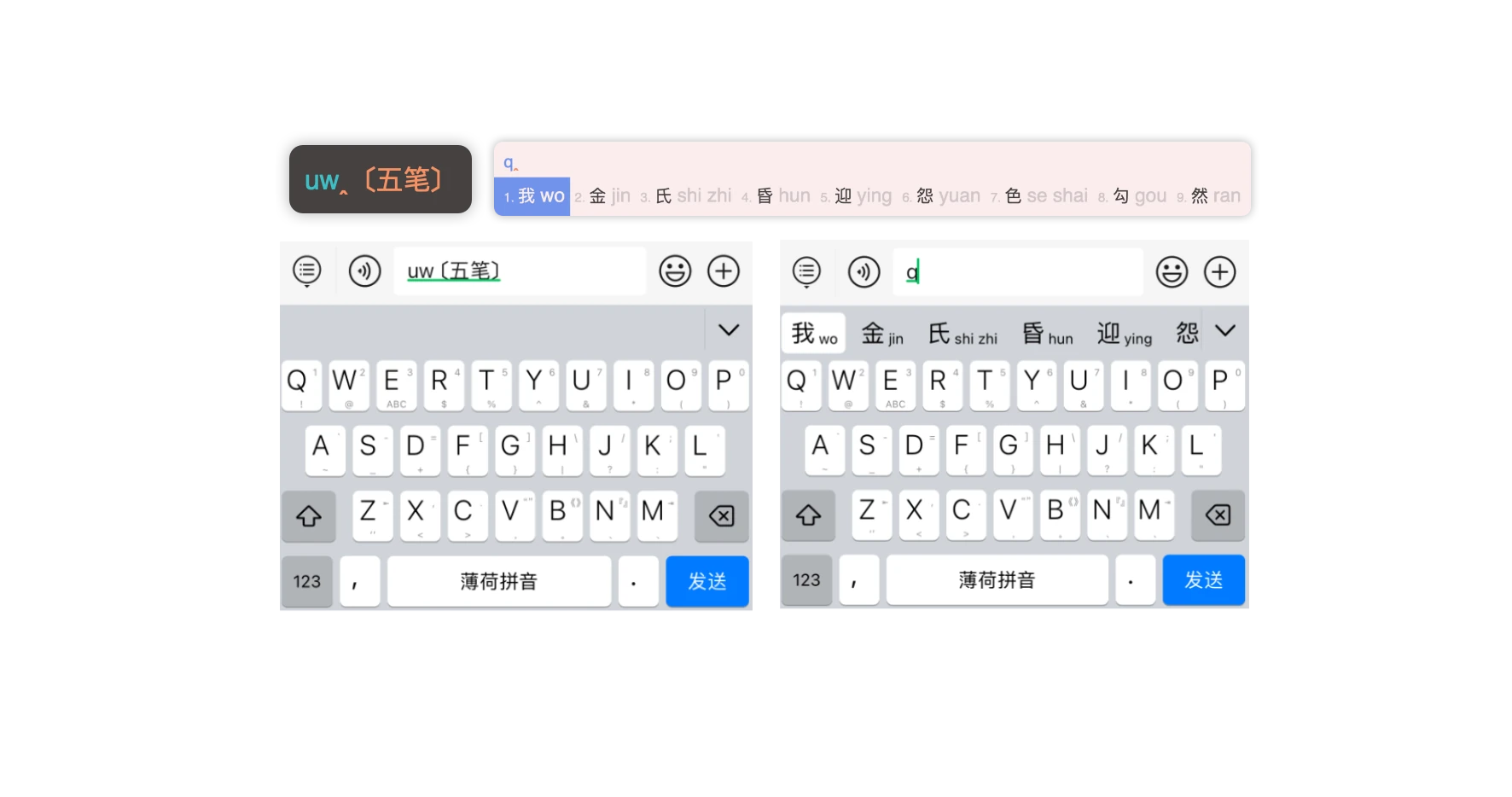Reverse Lookup Function ^2024.04
Reverse lookup, in simple terms, refers to using alternative input methods to find characters under the current input method.
Translation to English:
2024.04: The reverse lookup function, originally
uu/~u,uw/~w,ui/~i, etc., has been uniformly changed toUu,Uw,Ui, etc., for easy memory. More: 51779acb8
For example, using Wubi to view words under the current Pinyin input method.
The Oh-my-rime (Mint Input Method's Pinyin scheme) includes three types of reverse lookup:
- Character decomposition reverse lookup (Uu)
- Wubi reverse lookup (Uw)
- Stroke-based reverse lookup (Ui)
The Wubi input supports:
- Pinyin reverse lookup (Up)
Configuration Method
If you don't need certain reverse lookup features, you can perform reverse configuration according to this method.
Taking character decomposition reverse lookup as an example, import the decomposition scheme in the dependencies section at the beginning of the target input scheme:
dependencies:
- radical_pinyin_flypyThen, introduce the tag in the segmentors and translators sections under engine.
segmentors:
- ascii_segmentor # 標識西文段落
- matcher # 標識符合特定規則的段落,如網址、反查等
- affix_segmentor@radical_reverse_lookup # 引入的反查
- abc_segmentor # 標識常規的文字段落
- punct_segmentor # 標識句讀段落
- fallback_segmentor # 標識其他未標識段落
translators:
- punct_translator # ※ 轉換標點符號
- script_translator
- reverse_lookup_translator@radical_reverse_lookupthis tag can be defined as follows:
radical_reverse_lookup:
tag: radical_lookup
dictionary: radical_pinyin
enable_completion: false
enable_sentence: false
prefix: "Uu"
suffix: " '"
comment_format:
- erase/^.*$//
- xform/([nljqxy])v/$1ü/
tips: 〔拆字〕
reverse_lookup:
tags: [wubi98_mint,stroke,radical_lookup]
overwrite_comment: true
dictionary: dicts/rime_ice.8105At the end, introduce it in the recognizer section:
# 反查映射
recognizer:
import_preset: default
patterns:
punct: "^/([0-9]0?|[a-z]+)$"
radical_lookup: "Uu[a-z]*'?$"With that, the reverse lookup is configured.
Radical-based Reverse Lookup
Personally, I think this is the most practical type of reverse lookup; In Oh-my-rime, press Uu to activate the radical-based input mode. Subsequent inputs will be interpreted using the radical library.
For example: When you type Uuniuniuniu on the keyboard, it will be interpreted as the combination of "niu niu niu," which represents three "牛" (cows) and forms the character "犇".

Wubi Reverse Lookup
In Oh-my-rime's Mint Pinyin mode, use Uw to activate the Wubi mode. Subsequent inputs will be interpreted using Wubi.
For example: When you type Uwq on the keyboard, it will be interpreted as q. In the Wubi dictionary, it automatically retrieves the character 我 (me), which is convenient for combined character lookup.

The selected text translates to:
Stroke Reverse Lookup
In Oh-my-rime's Mint Pinyin mode, use Ui to activate the stroke mode, and the subsequent input content will be parsed using strokes.
Countdown to Removal
Considering that the stroke input method is used by too few people. We are considering removing the stroke reverse lookup and related stroke configurations. If you are still using stroke input or reverse lookup, please be sure to contact us, otherwise we may remove the stroke category in the future.
Pinyin Reverse Lookup
In Oh-my-rime's Wubi mode, use Up to activate the stroke mode, and the subsequent input content will be parsed using Pinyin.